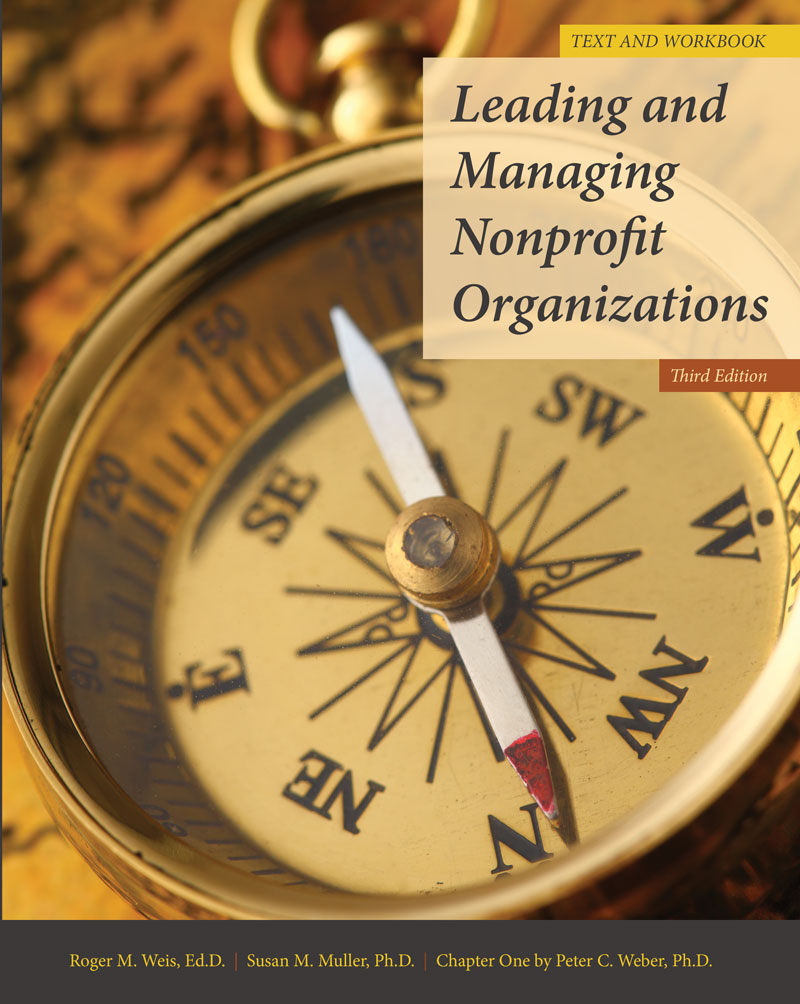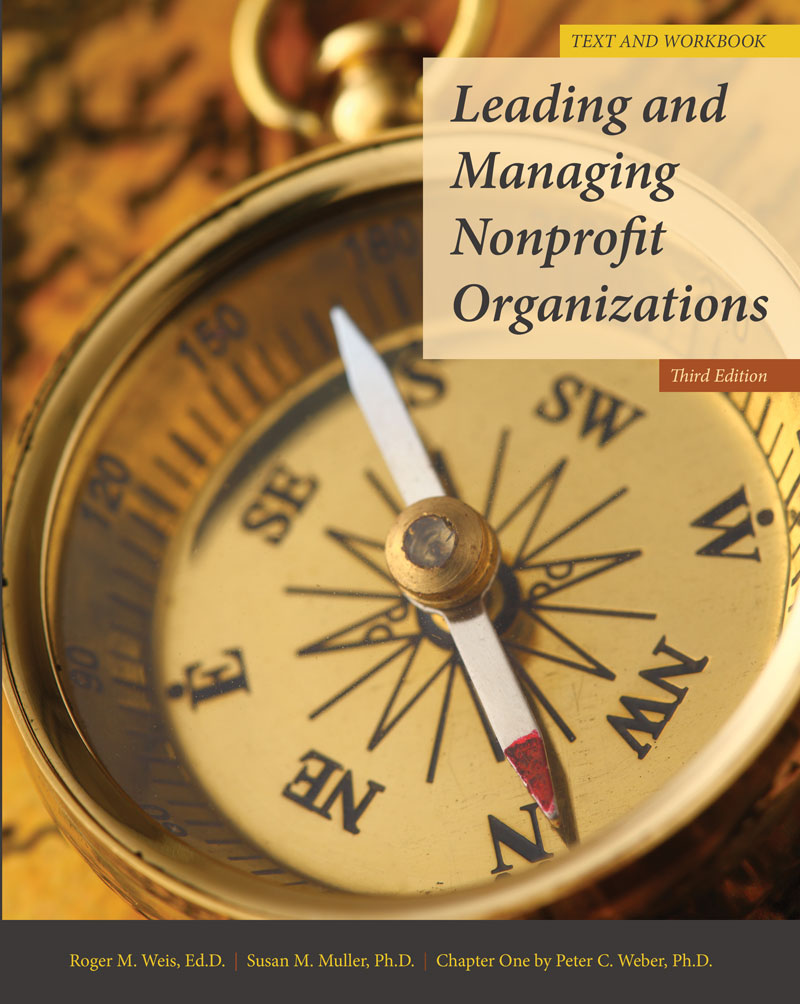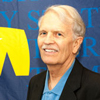Leading and Managing Nonprofit Organizations
Author(s): Roger M. Weis , Susan Muller , Peter C. Weber
Edition: 3
Copyright: 2017
Pages: 392
Edition: 3
Copyright: 2017
Pages: 392
Most reports indicate there are 1.6 million different private nonprofit organizations in the United States and tens of thousands of new positions open in youth, human service, and other nonprofit organizations each year. Leading and Managing Nonprofit Organizations presents information relevant to a number of competencies required to be leaders/managers in these organizations. This text provides opportunities to develop skills in these competency areas through classroom activities, simulations, and service learning projects. The competencies selected to be discussed in this NEW 3rd edition was done through surveys and reports developed by the Nonprofit Academic Centers Council (NACC) and the Nonprofit Leadership Alliance (NLA).
Leading and Managing Nonprofit Organizations features:
- a discussion of the history, purpose, and importance of the nonprofit sector throughout history.
- information on staff, board, and volunteer development as well as developing programs from beginning to end.
- an overview of financial processes and the importance of risk management.
- theories related to organizational development and support.
- tips on acquiring a career in the nonprofit sector including developing effective resumes, cover letters, and interview and networking techniques.
1 Understanding the Nonprofit Sector
A Professional Field
The Nonprofit Sector and Nonprofit Organizations
The Role of the Nonprofit Sector in Society
The Nonprofit Sector’s Long Historical Roots
Size and Scope of the Nonprofit Sector
Summary
Reflection and Application
References
Appendix: Journals, Websites, and Other Online Resources
2 Foundations of Leadership, Management, Character, and Ethics
Managing Nonprofit Organizations
Fundamentals of Leadership
What Is a Leader?
Leadership and Power
Leaders and Followers
Leadership Development
Leadership Theories and Models
The Connection Between Leadership, Character, and Ethics
Leaders Through the Ages
Using Mentoring to Develop Leaders
Developing Leaders Through Experiential Education
Summary
Reflection and Application
References
3 Staff, Board, and Volunteers: Leading Effectively
The Role of Organizational Leadership
Management Duties Required of the Executive Director
Board of Directors
Volunteers
Communication
Coaching/Counseling
A Final Thought
Summary
Reflection and Application
References
4 Human Development, Competencies, Issues, and Trends
Human Development
Developmental Theories
Developmental Competencies
Human Development Movement
Issues and Trends
Summary
Reflection and Application
References
5 Program Development, Marketing, and Promotion
A Customer-Centered/Benefits Approach to Program Development
Initial (Planning) Stage
Middle (Planning/Implementation) Stage
Final (Evaluation) Stage
A Plan to Improve Customer Service
Summary
Reflection and Application
References
6 Financial Processes and Financial Development
Financial Management of Budgeting
Financial Processes
Financial Development
A Final Thought
Summary
Reflection and Application
References
7 Risk Management
What Is Risk and Risk Management?
The Process for Developing a Risk Management Plan
Risk Management Guidelines for Specific Program Activities
Reports, Forms, Waivers, and Releases
Insurance
Summary
Reflection and Application
References
8 Organizational Development: Building Capacity, Impact, and Sustainability
Building Capacity
A Case for Broader Impact
Planning for Effective Application
Challenges and Opportunities
Sustaining Results
Final Thoughts
Summary
Reflection and Application
References
9 Career Planning and Professional Development
The Career Decision Process
The Résumé
Networking
References
Cover Letters
Interviewing
Assessing Job Offers
Professional Development
Summary
Reflection and Application
References
Index
Roger M. Weis is Professor for the Nonprofit Leadership Studies program at Murray State University (MSU). He has twice been selected as student advisor of the year and was the fi rst recipient of the Nonprofi t Leadership Alliance’s National Award for Excellence in Leadership and the first recipient of the Distinguished Service Learning and Civic Engagement Award at MSU. During his tenure, the program at MSU received numerous national and local awards for excellence in academics, leadership, service, and research and was the largest program in the country for quite some time. He has 14 books published.
Susan Marie Muller, Dean of Health Sciences at Stephens College, is a Master Certifi ed Health Education Specialist (MCHES). She earned her doctorate in Health Education from the University of Maryland College Park and has 33 years of teaching experience including nine years as a middle and elementary school health instructor, and 24 years as a college professor. She has held several leadership positions over the past two decades, most notably as the Dean, College of Health Sciences and Human Services (HSHS) at Murray State University and as an academic department chairperson at Salisbury University.
Peter C. Weber is Assistant Professor and Director of Nonprofit Leadership Studies at Murray State University. He holds a doctorate in Philanthropic Studies from the Indiana University Lilly Family School of Philanthropy, as well as a Master in History and a Master in International Studies in Philanthropy and Social Innovation, both from the University of Bologna in Italy. His research focuses on the role of civil society and international philanthropy in building democratic practices of governance in fledgling democracies from both a historical and a contemporary perspective. He has published his work in peer-reviewed journals such as Global Society, Voluntas, Nonprofit and Voluntary Sector Quarterly, and the Journal of Public Affairs Education.
Most reports indicate there are 1.6 million different private nonprofit organizations in the United States and tens of thousands of new positions open in youth, human service, and other nonprofit organizations each year. Leading and Managing Nonprofit Organizations presents information relevant to a number of competencies required to be leaders/managers in these organizations. This text provides opportunities to develop skills in these competency areas through classroom activities, simulations, and service learning projects. The competencies selected to be discussed in this NEW 3rd edition was done through surveys and reports developed by the Nonprofit Academic Centers Council (NACC) and the Nonprofit Leadership Alliance (NLA).
Leading and Managing Nonprofit Organizations features:
- a discussion of the history, purpose, and importance of the nonprofit sector throughout history.
- information on staff, board, and volunteer development as well as developing programs from beginning to end.
- an overview of financial processes and the importance of risk management.
- theories related to organizational development and support.
- tips on acquiring a career in the nonprofit sector including developing effective resumes, cover letters, and interview and networking techniques.
1 Understanding the Nonprofit Sector
A Professional Field
The Nonprofit Sector and Nonprofit Organizations
The Role of the Nonprofit Sector in Society
The Nonprofit Sector’s Long Historical Roots
Size and Scope of the Nonprofit Sector
Summary
Reflection and Application
References
Appendix: Journals, Websites, and Other Online Resources
2 Foundations of Leadership, Management, Character, and Ethics
Managing Nonprofit Organizations
Fundamentals of Leadership
What Is a Leader?
Leadership and Power
Leaders and Followers
Leadership Development
Leadership Theories and Models
The Connection Between Leadership, Character, and Ethics
Leaders Through the Ages
Using Mentoring to Develop Leaders
Developing Leaders Through Experiential Education
Summary
Reflection and Application
References
3 Staff, Board, and Volunteers: Leading Effectively
The Role of Organizational Leadership
Management Duties Required of the Executive Director
Board of Directors
Volunteers
Communication
Coaching/Counseling
A Final Thought
Summary
Reflection and Application
References
4 Human Development, Competencies, Issues, and Trends
Human Development
Developmental Theories
Developmental Competencies
Human Development Movement
Issues and Trends
Summary
Reflection and Application
References
5 Program Development, Marketing, and Promotion
A Customer-Centered/Benefits Approach to Program Development
Initial (Planning) Stage
Middle (Planning/Implementation) Stage
Final (Evaluation) Stage
A Plan to Improve Customer Service
Summary
Reflection and Application
References
6 Financial Processes and Financial Development
Financial Management of Budgeting
Financial Processes
Financial Development
A Final Thought
Summary
Reflection and Application
References
7 Risk Management
What Is Risk and Risk Management?
The Process for Developing a Risk Management Plan
Risk Management Guidelines for Specific Program Activities
Reports, Forms, Waivers, and Releases
Insurance
Summary
Reflection and Application
References
8 Organizational Development: Building Capacity, Impact, and Sustainability
Building Capacity
A Case for Broader Impact
Planning for Effective Application
Challenges and Opportunities
Sustaining Results
Final Thoughts
Summary
Reflection and Application
References
9 Career Planning and Professional Development
The Career Decision Process
The Résumé
Networking
References
Cover Letters
Interviewing
Assessing Job Offers
Professional Development
Summary
Reflection and Application
References
Index
Roger M. Weis is Professor for the Nonprofit Leadership Studies program at Murray State University (MSU). He has twice been selected as student advisor of the year and was the fi rst recipient of the Nonprofi t Leadership Alliance’s National Award for Excellence in Leadership and the first recipient of the Distinguished Service Learning and Civic Engagement Award at MSU. During his tenure, the program at MSU received numerous national and local awards for excellence in academics, leadership, service, and research and was the largest program in the country for quite some time. He has 14 books published.
Susan Marie Muller, Dean of Health Sciences at Stephens College, is a Master Certifi ed Health Education Specialist (MCHES). She earned her doctorate in Health Education from the University of Maryland College Park and has 33 years of teaching experience including nine years as a middle and elementary school health instructor, and 24 years as a college professor. She has held several leadership positions over the past two decades, most notably as the Dean, College of Health Sciences and Human Services (HSHS) at Murray State University and as an academic department chairperson at Salisbury University.
Peter C. Weber is Assistant Professor and Director of Nonprofit Leadership Studies at Murray State University. He holds a doctorate in Philanthropic Studies from the Indiana University Lilly Family School of Philanthropy, as well as a Master in History and a Master in International Studies in Philanthropy and Social Innovation, both from the University of Bologna in Italy. His research focuses on the role of civil society and international philanthropy in building democratic practices of governance in fledgling democracies from both a historical and a contemporary perspective. He has published his work in peer-reviewed journals such as Global Society, Voluntas, Nonprofit and Voluntary Sector Quarterly, and the Journal of Public Affairs Education.




